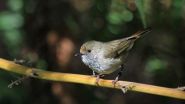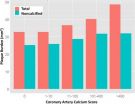Birds cry wolf to scare predators
One of Australia's smallest birds has found a cunning way to protect its nest from predators by crying wolf, or rather hawk, and mimicking the warning calls of other birds to scare predators threatening its nest
2015-06-03
(Press-News.org) One of Australia's smallest birds has found a cunning way to protect its nest from predators by crying wolf, or rather hawk, and mimicking the warning calls of other birds.
Researchers from The Australian National University (ANU) found that the tiny brown thornbill mimics the hawk warning call of a variety of birds to scare off predators threatening its nest, such as the larger pied currawong.
"It's not superbly accurate mimicry, but it's enough to fool the predator," said Dr Branislav Igic, who carried out the study during his PhD at ANU Research School of Biology.
"A physical attack on a currawong would be no good. They are 40 times the size of a thornbill and will eat adults as well as nestlings.
"I am amazed that such a tiny bird can mimic so many species, some much bigger than itself. It's very cunning," said Dr Igic, who has now taken up a position at the University of Akron, in Ohio, United States.
Although vocal mimicry is widespread amongst birds, its function is rarely understood. This study is the first to show that birds use vocal mimicry to scare predators.
The researchers stumbled across the thornbill's deceit during an experiment on birds' reaction to a stuffed owl, said Professor Robert Magrath, the leader of the research group at the Research School of Biology.
"I was puzzled because I could hear the alarm calls of robins, honeyeaters and rosellas, but I couldn't see any," he said.
"I soon realised that the brown thornbill was mimicking the other species, and and Branislav later discovered that they sometimes lie about the type of predator present when defending their nests," he said.
The researchers also used fake thornbill nests populated with chicken pieces to study the reaction of currawongs, which will typically feed a single brood about two kilograms of baby birds in a season.
When the researchers played recordings of the thornbill's trick calls, the currawongs were distracted for around sixteen seconds, which would be enough for nestlings to flee or seek cover.
The thornbill's own hawk warning call distracted the currawongs for only half as long.
The deception succeeds because currawongs eavesdrop on other species, Professor Magrath said.
"Many species of both birds and mammals eavesdrop on the alarm calls of other species. Natural communities form an information web about danger.
"Currawongs would normally benefit, because they are also vulnerable to hawks, but thornbills turn this against them," he said.
INFORMATION:
ELSE PRESS RELEASES FROM THIS DATE:
2015-06-03
A group of former senior editors, writing in The BMJ today, criticise a "seriously flawed and inflammatory attack" by The New England Journal of Medicine (NEJM) on what that journal believes have become overly stringent policies on conflicts of interest.
The NEJM was the first major medical journal to introduce conflict of interest policies in 1984. It required all authors to disclose any financial ties to health industries and made conflict of interests more transparent.
But recently the NEJM published a series of commentaries and an editorial that attempt to justify ...
2015-06-03
Bullying in teenage years is strongly associated with depression later on in life, suggests new research published in The BMJ this week.
Depression is a major public health problem with high economic and societal costs. There is a rapid increase in depression from childhood to adulthood and one contributing factor could be bullying by peers. But the link between bullying at school and depression in adulthood is still unclear due to limitations in previous research.
So a team of scientists, led by Lucy Bowes at the University of Oxford, carried out one of the largest ...
2015-06-03
There is no strong evidence that the popular smoking cessation drug varenicline is associated with increased risks of suicidal behaviours, criminal offending, transport accidents, traffic-related offences, and psychoses, finds a study in The BMJ this week.
The findings are based on over 69,000 individuals in Sweden who were prescribed varenicline between 2006 and 2009. Previous reports suggesting a link may not have taken full account of underlying risk factors, say the authors.
Varenicline is widely prescribed for the treatment of nicotine dependence, but reports that ...
2015-06-03
DURHAM, N.C. -- A long-term study of mother-child pairs in Pakistan has found that the children turn out pretty much the same, whether or not their mothers received treatment for depression during pregnancy.
An earlier study of the same population found that the mothers themselves benefited from the treatment, with less depression, and demonstrating related healthy behaviors with their newborns, such as breastfeeding. But those improvements were short-lived.
The "Thinking Healthy Programme" is a successful depression intervention evaluated through a randomized trial ...
2015-06-03
Washington, DC--Relying on the better-functioning side of the body after a stroke can cause brain changes that hinder rehabilitation of the impaired side, according to an animal study published June 3 in the Journal of Neuroscience. Strokes that occur in one brain hemisphere can result in poor motor function on the opposite side of the body, leading to heavy reliance on the "good" side. This study, led by Soo Young Kim and performed at the University of Texas at Austin and the University of California, Berkeley, found that such compensation produces structural brain changes ...
2015-06-02
OAK BROOK, Ill. -- Non-calcified arterial plaque is associated with diabetes, high systolic blood pressure and elevated 'bad' cholesterol levels in asymptomatic individuals, according to a new study published online in the journal Radiology.
Coronary artery disease (CAD) is the leading cause of death in men and women worldwide, accounting for 17 million deaths annually. Current treatment strategies focus on cardiovascular risk and serum cholesterol levels rather than direct assessment of extent of disease in the coronary arteries.
Plaque that forms in the arterial walls ...
2015-06-02
A new study shows that social and sensory overstimulation drives autistic behaviors. The study, conducted on rats exposed to a known risk factor in humans, supports the unconventional view of the autistic brain as hyper-functional, and offers new hope with therapeutic emphasis on paced and non-surprising environments tailored to the individual's sensitivity.
For decades, autism has been viewed as a form of mental retardation, a brain disease that destroys children's ability to learn, feel and empathize, thus leaving them disconnected from our complex and ever-changing ...
2015-06-02
You might not need to remember those complicated e-mail and bank account passwords for much longer. According to a new study, the way your brain responds to certain words could be used to replace passwords.
In "Brainprint," a newly published study in academic journal Neurocomputing, researchers from Binghamton University observed the brain signals of 45 volunteers as they read a list of 75 acronyms, such as FBI and DVD. They recorded the brain's reaction to each group of letters, focusing on the part of the brain associated with reading and recognizing words, and found ...
2015-06-02
San Antonio -- June 2, 2015 -- A close-up of Comet 67P/Churyumov-Gerasimenko by NASA's ultraviolet instrument surprised scientists by revealing that electrons close to the comet's surface -- not photons from the Sun as had been believed -- cause the rapid breakup of water and carbon dioxide molecules spewing from the surface.
Since last August, the European Space Agency's Rosetta spacecraft has orbited within a hundred miles of the comet in this historic mission. The spectrograph onboard, named Alice, specializes in the far-ultraviolet wavelength band and was developed ...
2015-06-02
Menopausal hormone therapy (MHT) given to recently postmenopausal women in the US for up to four years does not improve cognition, but may have some positive benefits for some mood symptoms, according to a study published by Carey Gleason and colleagues from the University of Wisconsin, Madison, USA, in this week's PLOS Medicine.
The researchers reached these conclusions by conducting a randomized placebo-controlled clinical trial (the KEEPS-Cog trial), including 693 recently postmenopausal women living in the US who were randomly assigned to receive either oral estrogen ...
LAST 30 PRESS RELEASES:
[Press-News.org] Birds cry wolf to scare predators
One of Australia's smallest birds has found a cunning way to protect its nest from predators by crying wolf, or rather hawk, and mimicking the warning calls of other birds to scare predators threatening its nest




